
We are committed to pursuing projects and initiatives that further education in the field of pediatric brain injuries.
THE AUGMENTATIVE LEARNING PROGRAM OF STUDY (ALPS)
When the Fairfax County Public Schools System closed in-person schools in March of 2020 due to the COVID-19 pandemic, it created a challenging situation for typical students and an impossible situation for students with disabilities. The Joseph Robert Shaw Foundation (dba Joey’s Foundation) realized that the public schools were overwhelmed and would not be able to provide a satisfactory learning alternative for students with disabilities. Necessity became an imperative so Joey’s Foundation created an Augmentative Learning Program of Study (ALPS) for students with disabilities.
Funds were raised from foundations and individual contributors to rent a house hire staff, and purchase school supplies and personal protective equipme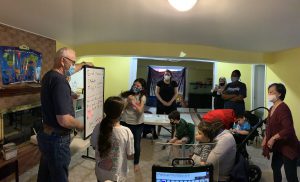 nt. The goal for the program was to provide an academically based, inclusive study group that would augment the limited instruction the students were receiving from their virtual school programs and ensure that these students would not fall behind because of their special needs.
nt. The goal for the program was to provide an academically based, inclusive study group that would augment the limited instruction the students were receiving from their virtual school programs and ensure that these students would not fall behind because of their special needs.
The staff consisted of a special education teacher and an occupational therapist. The two paid staff members were supported by the volunteer work of a special education professor from St. Francis University in Pennsylvania, a grandmother with a Master’s Degree in Education, a speech-language pathologist, caregivers and parents. The curriculum was aligned with the Virginia Standards of Learning (SOLs) and followed the school’s programming so that students would have support in their normal assignments. Materials were purchased with this goal, including literacy materials used in the public schools as well as math programs and manipulatives that would allow for hands-on learning.
The ALPS program was opened in September, 2020 on the ground floor of a rental house. The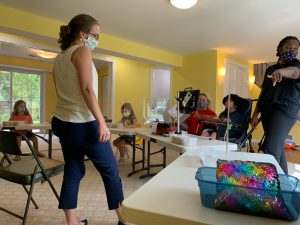 first floor of the house was wheelchair accessible, provided two large rooms for meeting, in addition to an outdoor patio and yard, as well as a backroom for private changing when needed. The first floor also provided a bathroom immediately upon entering the ho
first floor of the house was wheelchair accessible, provided two large rooms for meeting, in addition to an outdoor patio and yard, as well as a backroom for private changing when needed. The first floor also provided a bathroom immediately upon entering the ho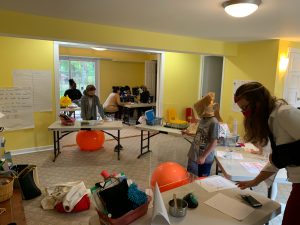 use to allow participants to wash their hands to maintain COVID protocol. Anyone entering the house had their temperature taken, masks were mandated and surfaces were wiped with disinfectant before and after class. Instead of desks, students were each provided with a four-foot table. The tables were arranged in a semi-circle around a meeting area. Plexiglass dividers separated the students at appropriate distances. The second room had a projector and a screen to show videos and websites as well as to project the AAC menu of words for all students to see. The layout was used fluidly
use to allow participants to wash their hands to maintain COVID protocol. Anyone entering the house had their temperature taken, masks were mandated and surfaces were wiped with disinfectant before and after class. Instead of desks, students were each provided with a four-foot table. The tables were arranged in a semi-circle around a meeting area. Plexiglass dividers separated the students at appropriate distances. The second room had a projector and a screen to show videos and websites as well as to project the AAC menu of words for all students to see. The layout was used fluidly
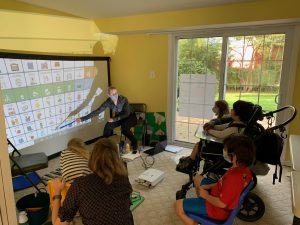 throughout each session, allowing for appropriate social-distancing as well as small group and individual work when needed.
throughout each session, allowing for appropriate social-distancing as well as small group and individual work when needed.
Throughout the entire year there was NOT one case of COVID for any student, teacher, volunteer or parent. For the initial four-month trial period, the group consisted of four students, two third graders and two first graders, each a set of siblings. One first grader was nonverbal and used an AAC eye gaze device. One first grader and one third grader had a medical diagnosis of PANDAS. The second four-month period included an additional first grader who was partially blind and partially deaf, two additional third graders and a fifth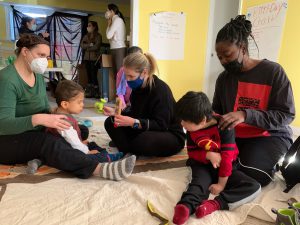 grader. A total of eight different students participated in the program.
grader. A total of eight different students participated in the program.
The group met three times per week for two-hour sessions with extended sessions on Saturdays. Time was divided between reading, math, spelling, science, goal setting, problem solving, social interaction and team work. Weather permitting, the students would work outdoors on the open-air patio or in the backyard.
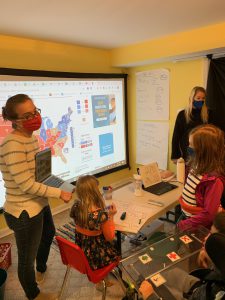
The first grade students participated in lessons from the Right Start Math Instruction Level A. Language Arts instruction was based on materials from Pioneer Valley, which provided leveled materials for both first and third grades. The content area units were based on the Virginia Standards of Learning for both first and third grades.
RESULTS OF THE PROGRAM WERE OUTSTANDING. All students progressed from pre-testing in September through post-testing at the end of the first semester in December on reading proficiency, mental processes to solve math word problems, goal setting and interactions with others. Language Arts performance was measured through the Pioneer Valley On-Line Assessment Program. Students were also given pre-tests and post-tests related to the units studied throughout ALPS and all had significant recall of facts and understanding of concepts at grade level or higher.
The special education teacher stated that “perhaps the greatest benefit of the program was how the group coalesced together, saw themselves as a cohesive group and looked out for one another’s interest and needs.” Socialization is of particular importance to a cohort of students with disabilities who often learn from observing the behavior of typical students. The ALPS program provided a safe space where students could work together, learn together and play together. Social development was one of the major successes 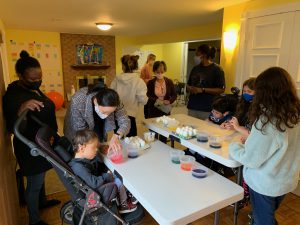 of the program. These children not only survived the pandemic but they thrived as a result of ALPS.
of the program. These children not only survived the pandemic but they thrived as a result of ALPS.
Thank you for your financial support and for caring about the continuing education of some of the most vulnerable members of our society. Your support made a significant difference in the lives of these children and their families. We are deeply grateful for your understanding of the need and your support. We will continue the ALPS program through the summer and provide final post-testing. You have made a successful investment in the future of these special children. Thank you once again for all that you have done to make the Augmentative Learning Program of Study successful. We could not have implemented this program without you.


